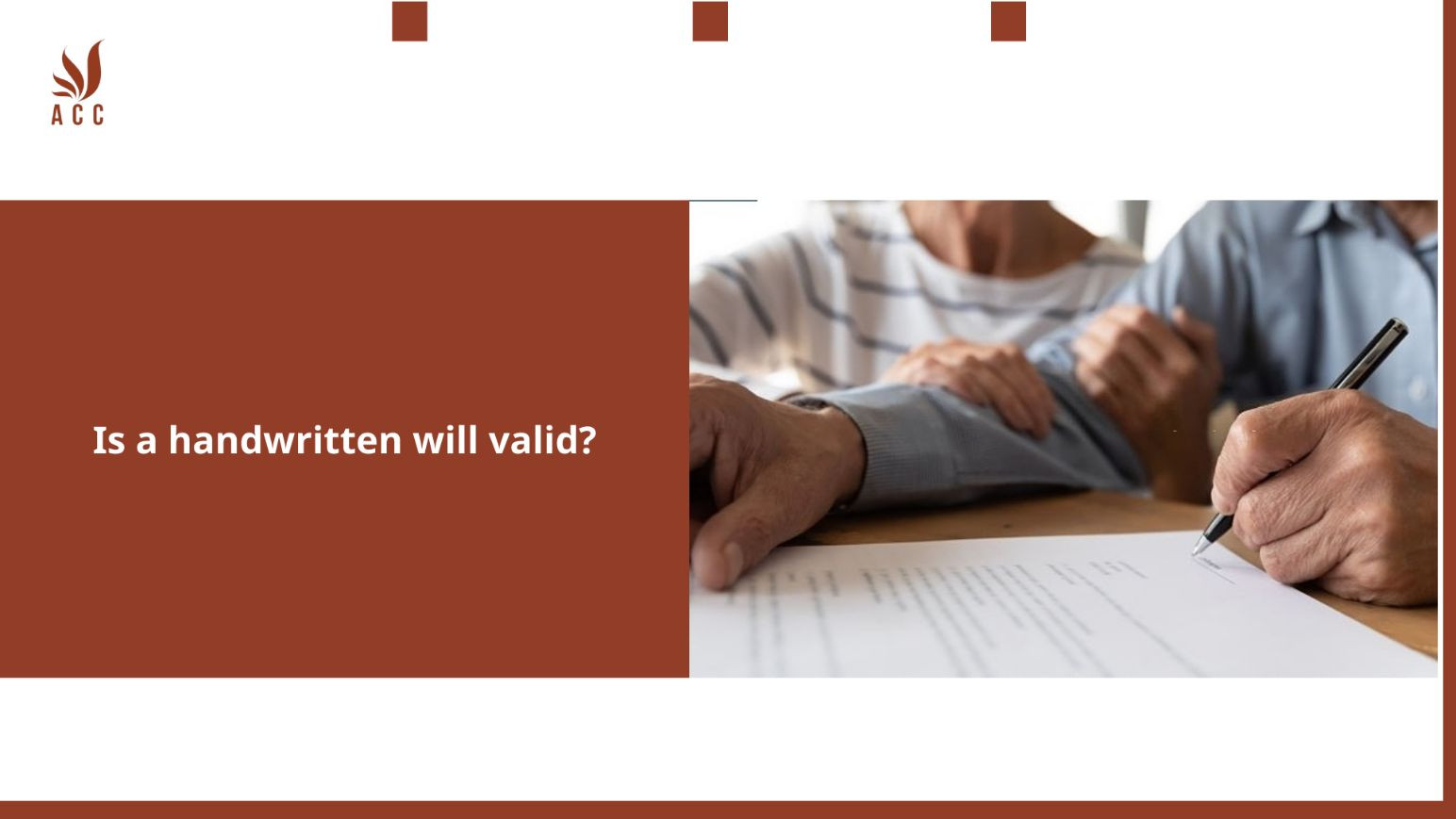The validity of a handwritten will, also known as a holographic will, depends on the laws and regulations of the jurisdiction where it is created. In many jurisdictions, a handwritten will can be legally valid if it meets specific requirements, but these requirements can vary from place to place. Here are some general principles regarding the validity of handwritten wills:

1. Compliance with Local Laws:
The validity of a handwritten will is typically determined by whether it complies with the legal requirements of the jurisdiction where it was created. These requirements may include rules about the format, the presence of witnesses, and the age and capacity of the testator (the person making the will).
2. Witness Requirements:
Some jurisdictions require that handwritten wills be witnessed by one or more individuals who are not beneficiaries. Witnesses may need to attest to the testator's signature and confirm that the will was created voluntarily and without undue influence.
3. Age and Capacity:
The testator must generally be of sound mind and of a certain age (usually 18 or older) to create a valid will.
4. Revocation and Updates:
A handwritten will can be revoked or updated by the testator at any time, provided they meet the legal requirements for doing so.
5. Storage and Preservation:
It's essential to store the handwritten will in a safe and accessible place, inform the executor and trusted individuals of its location, and ensure it is kept in good condition. This helps prevent loss or damage that could affect its validity.
6. Contestability:
Handwritten wills are sometimes more vulnerable to legal challenges or disputes, especially if they lack clarity or if there are concerns about the testator's capacity or undue influence.
7. Local Laws Vary:
The specific rules for handwritten wills can vary significantly by jurisdiction. Some places may not recognize handwritten wills at all, while others may have specific laws governing their use.
Q&A
Q1: Is a handwritten will considered legally valid?
A1: The validity of a handwritten will, also known as a holographic will, depends on the laws of the specific jurisdiction. In some jurisdictions, a handwritten will may be considered legally valid even if it does not meet the formal requirements of a typed or printed will. However, it is important to note that the laws regarding holographic wills can vary significantly, and some jurisdictions may not recognize them at all. It is advisable to consult with a lawyer or legal professional in your jurisdiction to understand the specific requirements for a handwritten will to be considered valid.
Q2: What are the typical requirements for a handwritten will to be considered valid?
A2: The requirements for a handwritten will to be considered valid can vary depending on the jurisdiction. However, some common requirements include:
- The entire will must be written by hand by the testator (the person making the will).
- The will should clearly express the testator's intentions and wishes.
- The testator must be of sound mind and capable of understanding the implications of the will.
- The will should be dated to establish its timeline.
- Some jurisdictions may require the testator's signature or a specific statement indicating that it is their will.
Again, it is important to consult with a lawyer or legal professional in your jurisdiction to understand the specific requirements for a handwritten will to be considered valid.
Q3: Can a handwritten will be challenged or disputed more easily than a formal will?
A3: Handwritten wills, due to their informal nature, can be more susceptible to challenges or disputes compared to formal wills. The lack of witnesses or notarization may raise questions about the authenticity, mental capacity, or undue influence involved in creating the will. Additionally, the interpretation of handwritten provisions may be subject to different interpretations or ambiguities. It is important to consult with a lawyer or legal professional to ensure that your handwritten will is properly executed and to minimize the risk of challenges or disputes.
Q4: Is it recommended to have a handwritten will reviewed or transcribed by a lawyer?
A4: It is generally recommended to have a handwritten will reviewed or transcribed by a lawyer to ensure its legality and clarity. A lawyer can help ensure that the will complies with the specific legal requirements of your jurisdiction and can provide guidance to minimize the risk of challenges or disputes. They can also assist in properly executing the will and storing it in a safe and accessible manner. Seeking legal advice can provide peace of mind and help ensure that your wishes are accurately reflected in the will.
Nội dung bài viết:






Bình luận